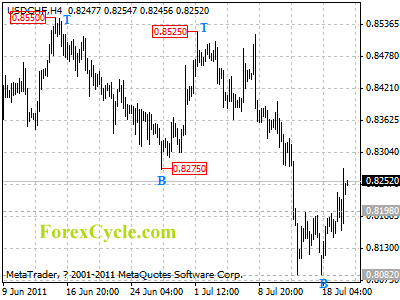Contributor article by www.taipanpublishinggroup.com.
As the debt ceiling debate heats up, President Obama claims most Americans are OK with higher taxes. Are you?
As the U.S. debt ceiling deadline moves closer, the bond market takes it in stride. The 10-year U.S. Treasury note trades within spitting distance of eight-month highs.
Investors seem confident a deal will get done, if only because the consequences for a miss would be so dire. Republicans and Democrats are playing a fierce game of “chicken” — driving their cars straight toward each other at full speed — but one or both will swerve at the last second.
And while the bond market itself is relaxed, the rhetoric is getting heated. From TheHill.com (emphasis mine):
President Obama on Friday kept up the pressure on Republicans to agree to revenue increases in a deal to raise the debt ceiling, claiming 80 percent of the public supports Democrats’ demand for tax increases.
“The American people are sold,” Obama said. “The problem is members of Congress are dug in ideologically.”
Throughout the press conference, Obama blasted Republicans for ignoring what he said is the will of the American people by rejecting tax increases that would balance out spending cuts in a debt package.
It is not clear where the POTUS got his numbers. According to Rasmussen Reports, a polling agency, the stats are quite different:
Just 34% think a tax hike should be included in any legislation to raise the debt ceiling. A new Rasmussen Reports national telephone survey finds that 55% disagree and say it should not.
There is a huge partisan divide on the question. Fifty-eight percent (58%) of Democrats want a tax hike in the deal while 82% of Republicans do not. Among those not affiliated with either major political party, 35% favor a tax hike and 51% are opposed.
For your editor, two very important questions remain unanswered here:
- What would the money be spent on?
- Higher taxes for who?
For those who do not want a tax hike, it is reasonable to mark the difference between (1) spending money on useful goods and services and (2) throwing it down a rat hole. Washington is all too skilled at the second option. Haven’t we had enough of that?
Those who fiercely oppose higher taxes are criticized as shortsighted and irresponsible. The dangers of blowing the debt ceiling, they are told, should concentrate the mind and elevate it above partisan bias.
But what about the long-term dangers of continuing to spend like drunkards? The burdens placed on children and grandchildren?
Then the other question remains, “Higher taxes for who?” And what about the entities that benefited from hundreds of billions to trillions worth of bailouts — the voracious eaters of taxpayer funds in the first place?
In the grand scheme of things, there is a canyon-like divide between big business and small business. Big business is on the side of Washington and Wall Street, where the cash and benefits gush handsomely. Small business is on the other side, where dust-bowl conditions persist.
It is no accident that unemployment numbers remain high under this arrangement. Historically, small business accounts for half of economic production or more, and virtually all the net new job creation. Large corporations, as important as they are, tend to be net reducers of jobs as they find ways to go about their business more efficiently.
Should it be any surprise, then, that systemically funneling tax breaks and bailout cash to the “big boys,” while making middle-class taxpayers and small businesses foot the bill, is a losing proposition on the whole?
On one level, the whole system seems crazy. On another level it makes perfect sense — if you look at it through a purely Darwinian, “survival of the fittest” type lens.
When government is the source of largesse and handouts, those who count as “fit” are the ones closest to the power center, and thus best enabled to milk the system. Those furthest from the power center — middle-class consumers and scrappy small businesses — are the scrawny cash cows being milked to the last drop.
At the end of the day, there is another, even more important question to answer: “How do we stop the blackmail?”
The massive financial system bailouts, in which hundreds of billions were stealth-transferred to the banks, came about as a form of blackmail. “Save the system or the economy gets it.” With the debt ceiling debate, the same logic applies. “Let us keep borrowing or the economy gets it.”
The catastrophe threat has merit. No one wants to see the global financial system suffer yet another paralyzing heart attack. (Or at least, very few do.)
But at what point does one say “enough is enough” when it comes to corrupt and irresponsible behavior, in which the crimes only get bigger and the threats only get worse? How many future debt ceilings are we going to raise? How many stealth bailouts and manipulated currency debasements are we going to endure, without ever tackling the true problem — the wasteful and corrupt nature of our spending in the first place?
Written by Justice Litle for Taipan Publishing Group. Additional valuable content can be syndicated via our News RSS feed. Republish without charge. Required: Author attribution, links back to original content or www.taipanpublishinggroup.com.



